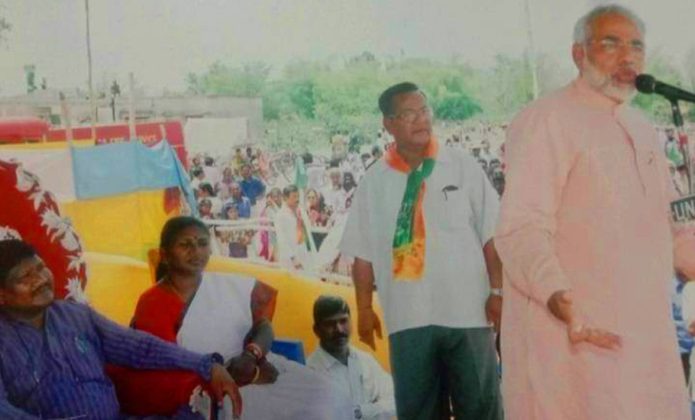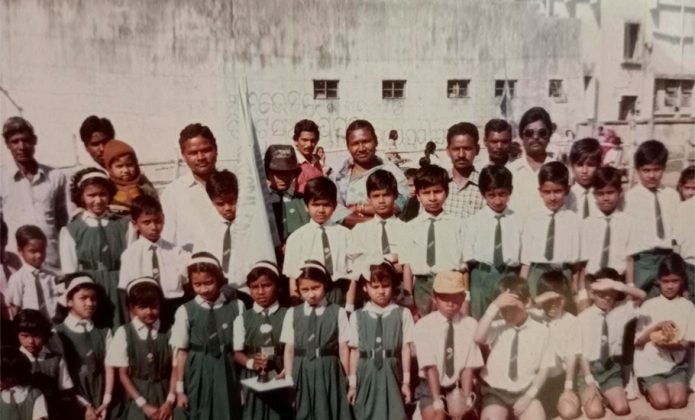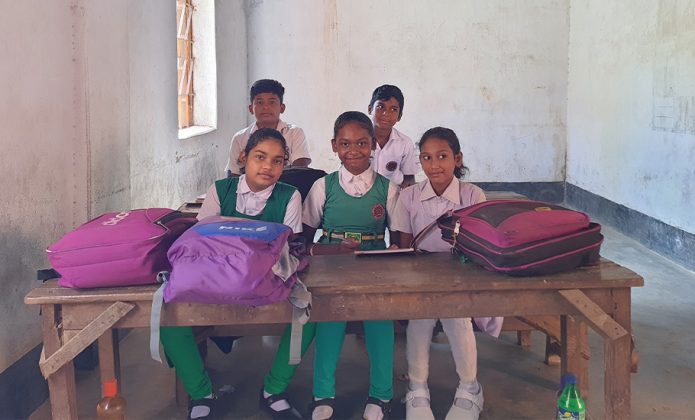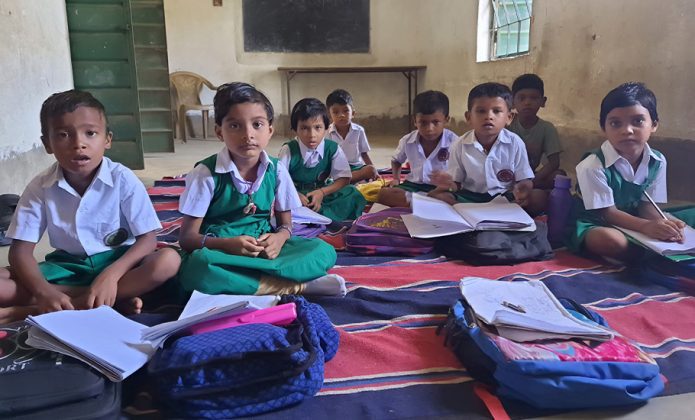
- Home
- India
- World
- Premium
- THE FEDERAL SPECIAL
- Analysis
- States
- Perspective
- Videos
- Sports
- Education
- Entertainment
- Elections
- Features
- Health
- Business
- Series
- In memoriam: Sheikh Mujibur Rahman
- Bishnoi's Men
- NEET TANGLE
- Economy Series
- Earth Day
- Kashmir’s Frozen Turbulence
- India@75
- The legend of Ramjanmabhoomi
- Liberalisation@30
- How to tame a dragon
- Celebrating biodiversity
- Farm Matters
- 50 days of solitude
- Bringing Migrants Home
- Budget 2020
- Jharkhand Votes
- The Federal Investigates
- The Federal Impact
- Vanishing Sand
- Gandhi @ 150
- Andhra Today
- Field report
- Operation Gulmarg
- Pandemic @1 Mn in India
- The Federal Year-End
- The Zero Year
- Science
- Brand studio
- Newsletter
- Elections 2024
- Events
- Home
- IndiaIndia
- World
- Analysis
- StatesStates
- PerspectivePerspective
- VideosVideos
- Sports
- Education
- Entertainment
- ElectionsElections
- Features
- Health
- BusinessBusiness
- Premium
- Loading...
Premium - Events
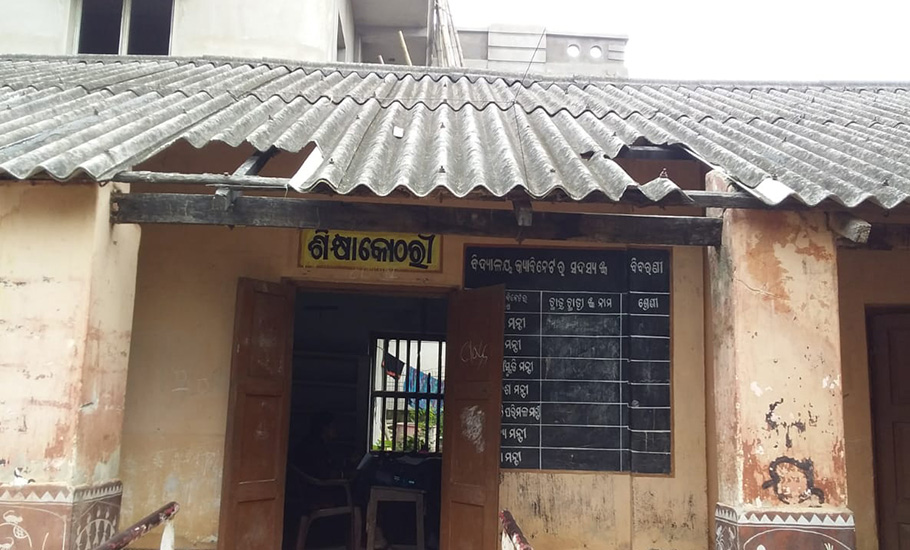
School where President Murmu taught is crumbling. But no one noticed until now

In her acceptance address at the Central Hall of Parliament soon after being sworn in as the 15th President of India on July 25, Droupadi Murmu recalled her stint as a teacher at the Sri Aurobindo Integral Education and Research Centre, a school at Rairangpur in Odisha’s Mayurbhanj district. President Murmu, who taught at the school from 1994 to 1997, said Sri Aurobindo’s thoughts...
In her acceptance address at the Central Hall of Parliament soon after being sworn in as the 15th President of India on July 25, Droupadi Murmu recalled her stint as a teacher at the Sri Aurobindo Integral Education and Research Centre, a school at Rairangpur in Odisha’s Mayurbhanj district. President Murmu, who taught at the school from 1994 to 1997, said Sri Aurobindo’s thoughts on education continue to inspire her as the nation gears up to mark the 150th birth anniversary of the celebrated scholar.
This reference infused a sense of pride in the teachers, students and others associated with the institution hundreds of kilometers away in Rairangpur. Much like the rest of Odisha, those affiliated to the school, too, had celebrated Murmu’s victory on the day of the counting of votes for the presidential polls. The school, affiliated to New Life Education Trust, organised a function that day which had in attendance the students, alumni, their parents, teachers — both serving and retired, some of them her former colleagues. There was a special prayer during the day and sweets were distributed among the students.

For some this wasn’t just the elevation of Murmu, an adivasi woman, to the highest office in India, but also a ray of hope for the school where enrolment has been dropping consistently and infrastructure is either absent or collapsing.
Thanks to the media publicity post Murmu’s presidential candidature being announced, school authorities happily share that the institution’s strength is going to increase by at least 20 more students before August comes to an end as many parents are calling to enquire about the admission process.
The excitement of those running the school, however, may not last too long. More students would mean added burden on the already dilapidated infrastructure of the school.
Although the school offers education from nursery to Class 7, only those in Classes 5 to 7 have access to chairs and desks. The others, including nursery kids, sit on the ground. The one luxury they have is that each class is held in a separate room. Come monsoon and this luxury too means little as water drips through the asbestos roofs making it impossible to hold classes. The walls of the school too have developed cracks and pose a risk to the students. The school runs with seven teachers and two non-teaching staff who are paid honorarium.
The school, where the incumbent President once taught, suffers from poor sanitary conditions putting at risk the health of young children.
The school lacks a proper ground and so for their annual sports events, children travel to the ground of the block office, located close to the ground.
Incidentally, this school, which started on August 15, 1984, was the first English-medium school in Rairangpur town. Although on paper the school owns an area of 29 decimals of land, a road running next to the school occupies five decimals of it.
Sri Aurobindo Integral School, Rairangpur, is run by the New Life Education Trust. Asisha Kumar Pradhan, accountant of New Life Education Trust, Cuttack, says, “New Life Education Trust is a branch of the Sri Maa Aurobindo Center Puducherry.”
Pradhan says there are over 600 schools in Odisha which are affiliated to the New Life Education Trust. Every year the state government provides a nominal amount to New Life Education Trust to run the schools, which in turn, disburses the money further to individual schools.
The managing committees of the respective schools enjoy complete control over the money assigned to run the schools. They also appoint the staff and look after the day to day operations.
A study circle is a prerequisite to start any Sri Aurobindo Centre. A 10*10 feet room behind the Rairangpur school, now earmarked as the meditation room, is the spot where Sri Aurobindo study circle was set up in 1949. It was the first study circle to come up in Odisha.
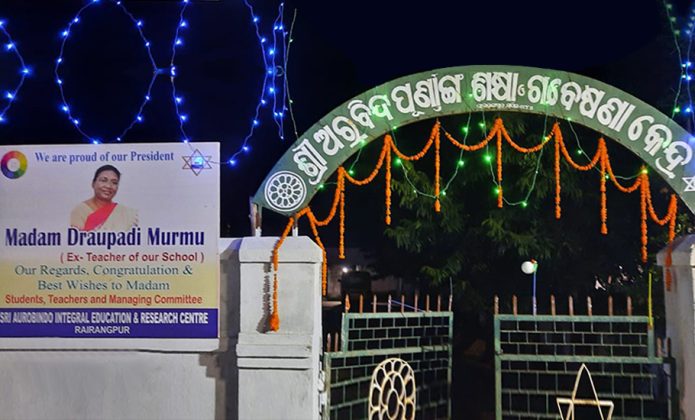
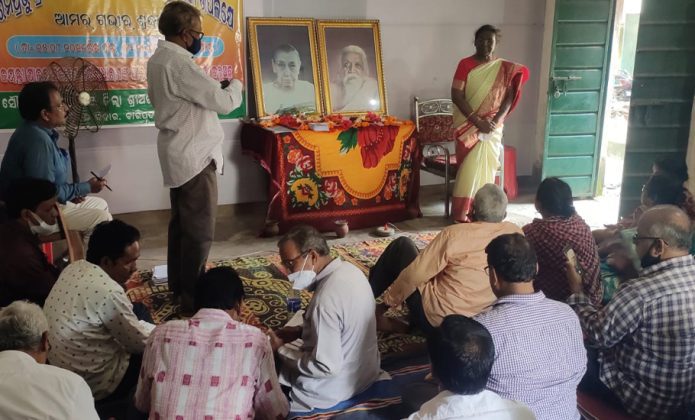
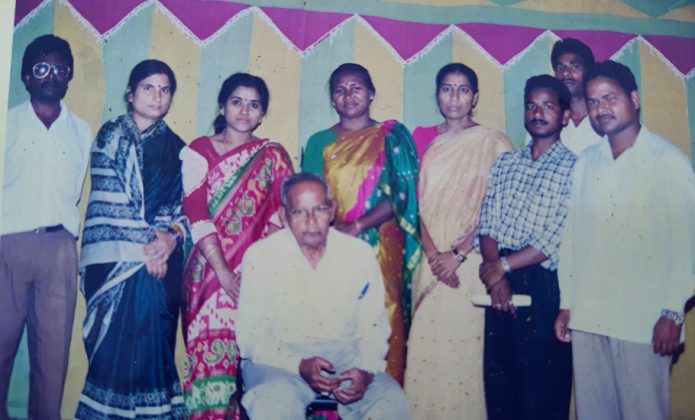
Sri Aurobindo Integral School’s building was constructed in a phased manner with the help of donations received from people. Indira Otta, who was a colleague of President Murmu, was one of the first teachers at the school and has been associated with it until recently. Otta, who went on to become the school principal and retired a few years ago, says, “Earlier, the school was buzzing with the chattering of over 250 students. Back when Murmu didi (elder sister) was teaching in the school, they had well over 200 students.”
Much has changed since.
By 2020, fewer than 150 students were studying at the school. The Covid pandemic took a further toll on the number. When the school reopened after nearly two years, many students took admission in other schools. Today, only about 60 students study at the school.
“All students remain present during exam days. Otherwise, on an average, just over 50 attend classes regularly,” shares Pramila Swain, the principal of the school.
While only a few of the school’s students are from the Rairangpur town, the majority come from villages surrounding it. A parent has to pay Rs 300 as monthly fee per child. An extra amount is charged as transportation fee. The school has hired a van for the convenience of students but it falls short of serving the transportation needs of all students.
The school administration claims its condition is dismal and the enrolment has continuously slipped despite many of its alumni doing well in life. The school’s secretary, Satya Narayan Nayak, say that many former students have done well in their careers. One of them works as a senior software professional in the US and scores of them are working in different cities of India. A few have returned to Rairangur and are running their own businesses.
“We are suffering from a funds crunch. To save the school, we need resources,” says Nayak.
The state of the school notwithstanding, those associated with the school and people in the area are happy about one of their own rising to occupy the Rashtrapati Bhavan.
Rabindra Pattnaik, president of the managing committee of the Sri Aurobindo Integral Education and Research Centre, shares his memories of Murmu’s stint as a teacher. “She was very punctual and sincere. Carrying an umbrella, she would walk to the school and she would be the first to arrive there. She never took any honorarium,” Pattnaik recalls.
“She wasn’t a very well-known figure then. Not many knew her prior to her joining the school in 1993,” reminisces Pattnaik.
Just next to the school stands the house of late Rabindra Nath Mahanta, former BJP Mayurbhanj district president. It is said he was asked by the then BJP’s state organising secretary, Prasanna Mishra, to identify an educated tribal woman who could be the party’s candidate in the polls. Many say, inspired by Murmu’s commitment to her school and students, Mahanta requested her to join the party.
According to Pradip Rout, a long-time BJP sympathiser, Murmu turned down Mahanta’s request initially, but finally relented. She contested and won the Notified Area Council polls in 1997 and became a councillor. The rest is history.
“We are extremely happy for her. At least, we can proudly say that one of our teachers is now President of the country,” says Nayak.
With Murmu becoming the President, the school has received a lot of publicity but what it needs urgently is attention and efforts to save it from shutting down with students looking away and enrolments dropping.
It remains to be seen whether the attention Sri Aurobindo Integral School has drawn can get it at least a leak-proof roof, desks, benches, proper sanitation to start with.

